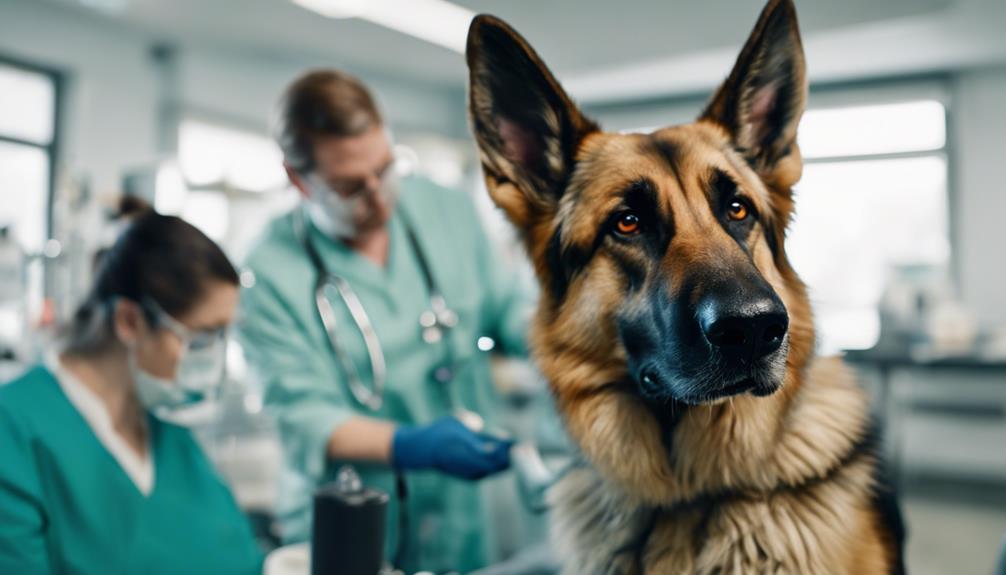🐾 Paw-some Partnership Alert! 🐾
As a pack of German Shepherd enthusiasts at MixGermanShepherd.com, we're always sniffing out the best products for our furry friends. Guess what? When you fetch something from Amazon through our links, we earn a little treat! 🦴
Imagine your German Shepherd mix as a sturdy ship navigating through rough waters, but even the most robust vessel can encounter storms. In those critical moments, knowing how to steer through emergencies can be a lifesaver for your beloved companion. From sudden illnesses to accidents, being equipped with the right knowledge and tools can be the difference between panic and calm action. You'll want to stay tuned to learn how you can be prepared to handle unexpected situations with your German Shepherd mix efficiently and effectively.
Key Takeaways
- Recognize emergency signs like panting, bloating, or lethargy promptly.
- Provide immediate care for breathing issues, trauma injuries, allergic reactions, and poisonings.
- Safely transport and seek vet care with breed info, symptoms, and quick response.
- Prevent emergencies by monitoring health, avoiding toxins, and being prepared for heatstroke.
Recognizing Emergency Signs in German Shepherd Mixes
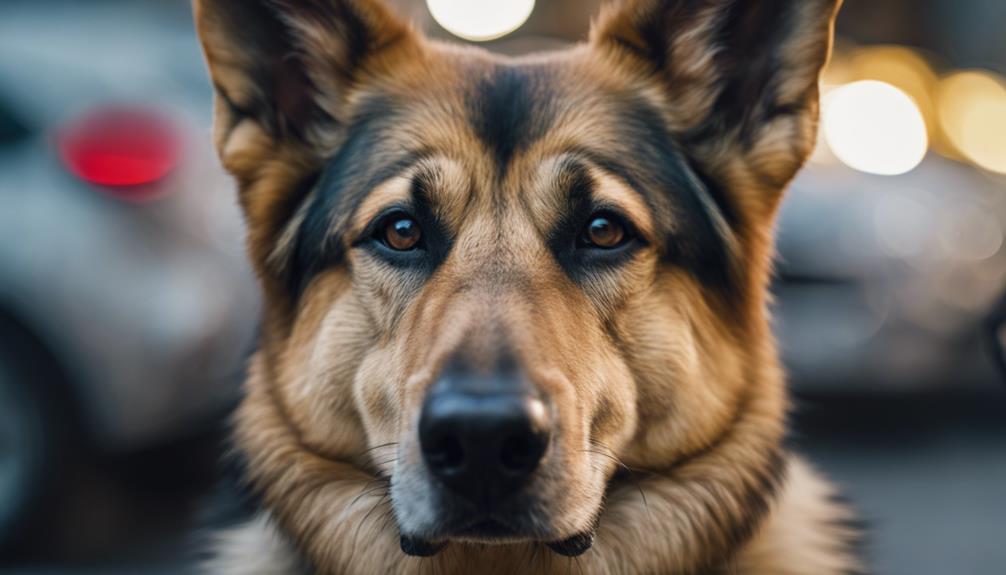
If your German Shepherd mix shows signs of distress such as excessive panting, restlessness, or pacing, it's important to pay close attention as these could be indicators of a potential emergency. German Shepherd mixes are prone to various health issues, including abdominal bloating, which can turn into a life-threatening situation if not addressed promptly. Watch out for symptoms like pale gums, rapid heartbeat, or difficulty breathing in your furry companion. Additionally, signs of abdominal bloating, lethargy, or unresponsiveness should not be taken lightly, as they could signal an emergency requiring immediate veterinary attention.
Handling Breathing Emergencies in German Shepherd Mixes
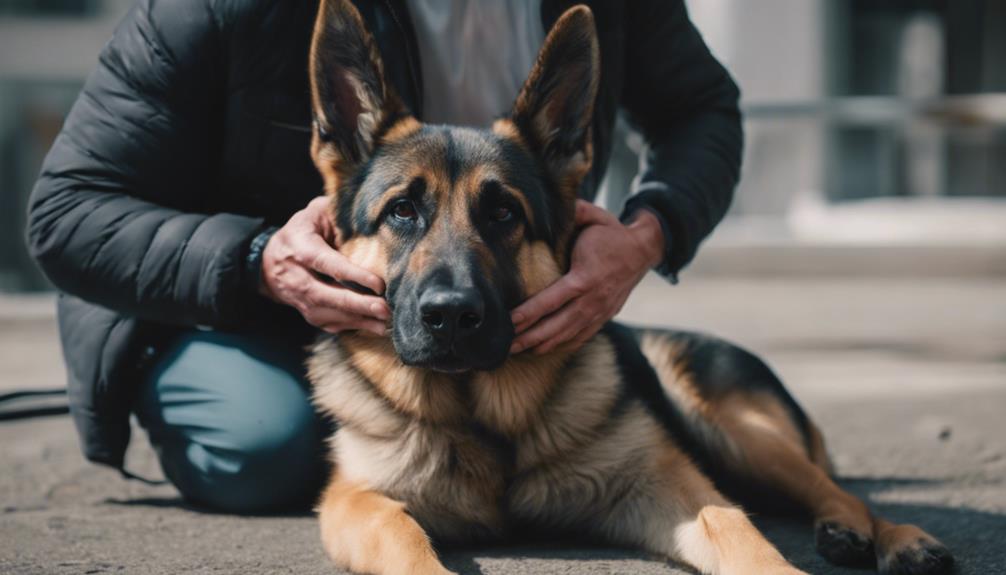
Handling breathing emergencies in German Shepherd mixes requires immediate action to address potential choking, respiratory distress, or airway obstructions. When faced with such a critical situation, it is essential to act swiftly and decisively to help your furry friend. Here are three key steps to assist you in managing breathing emergencies in German Shepherd mixes:
- Assess the Situation: Quickly evaluate the dog's symptoms and look for signs of choking, difficulty breathing, or unusual sounds like wheezing. Determine if there are any visible obstructions in the airway that need to be cleared promptly.
- Perform Basic First Aid: If the dog is choking or having trouble breathing, try to clear the airway by gently opening the mouth and removing any visible obstructions. In cases of respiratory distress, consider administering rescue breaths following proper guidelines.
- Contact a Veterinarian: Remember, time is of the essence in breathing emergencies. Contact your veterinarian or the nearest emergency vet clinic immediately for professional guidance, diagnosis, and treatment to ensure the best possible outcome for your German Shepherd mix.
Managing Allergic Reactions in German Shepherd Mixes
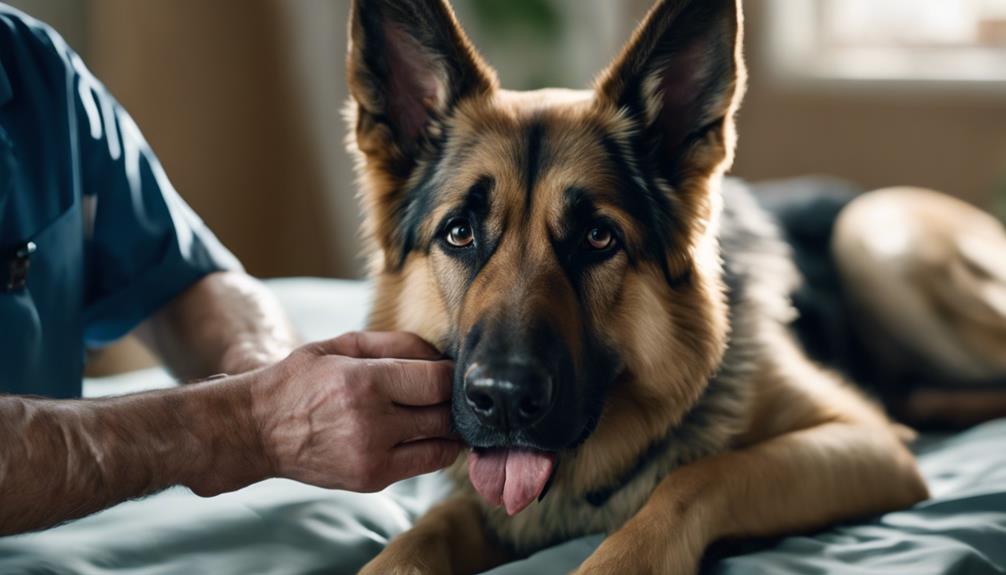
If your German Shepherd mix displays symptoms like itching, redness, swelling, or skin irritation, it may be experiencing an allergic reaction. Identifying common allergens in your dog's environment or diet is crucial for managing these reactions effectively. Administering emergency allergy treatment as advised by a veterinarian can help alleviate discomfort and prevent severe complications.
Identifying Common Allergens
To effectively manage allergic reactions in German Shepherd mixes, it is crucial to accurately identify the common allergens that may be triggering these responses. Here are three key steps to help you identify common allergens in your German Shepherd mix:
- Consult with a Veterinarian: Seek professional advice to conduct allergy testing and pinpoint specific triggers affecting your dog.
- Monitor Environmental Factors: Keep track of your dog's reactions in different environments to identify potential triggers like pollen or dust mites.
- Review Diet and Food Allergies: Assess your dog's diet and consult with a vet to determine if certain foods are causing allergic reactions.
Administering Emergency Allergy Treatment
Upon identifying common allergens in your German Shepherd mix, knowing how to administer emergency allergy treatment is crucial for managing allergic reactions effectively. Allergic reactions in your pet may manifest as itching, redness, swelling, or hives. In cases of emergency treatment, antihistamines prescribed by a veterinarian can help alleviate symptoms. It is vital to refrain from giving your German Shepherd mix any human medications without proper veterinary guidance during allergic emergencies. Be proactive in understanding potential allergens that could trigger reactions in your pet, and have a plan in place for prompt intervention. Always consult with a veterinarian for guidance on the appropriate use of antihistamines and other emergency allergy treatments.
| Allergic reactions | Emergency treatment |
|---|---|
| Itching | Antihistamines |
| Redness | Veterinary guidance |
| Swelling | Prompt intervention |
Addressing Trauma Injuries in German Shepherd Mixes
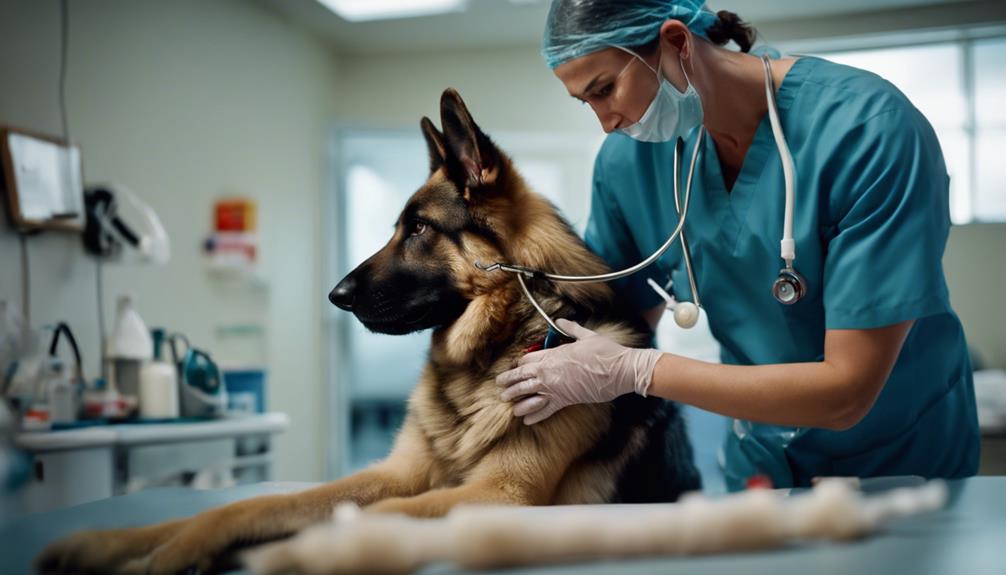
When addressing trauma injuries in German Shepherd mixes, immediate medical attention is crucial to prevent further complications and ensure proper care. Here are three essential steps to consider:
- Recognize Symptoms: Watch out for signs such as limping, bleeding, or indications of distress in your German Shepherd mix. Identifying these symptoms promptly can help in assessing the severity of the trauma injury.
- Seek Professional Help: Contact your veterinarian or an emergency animal clinic immediately. Professional evaluation and treatment are necessary to address trauma injuries effectively and prevent any worsening of the condition.
- Handle with Care: Properly handle and stabilize your German Shepherd mix to prevent exacerbating the injury. Avoid moving the dog unnecessarily and ensure they are comfortable and secure until veterinary assistance is available.
Dealing With Poisoning Incidents in German Shepherd Mixes

Recognize the signs of poisoning in your German Shepherd mix promptly to take swift action and ensure their well-being. If you notice symptoms like vomiting, diarrhea, lethargy, or seizures, it's crucial to act fast. Contact your veterinarian or the ASPCA Animal Poison Control Center immediately if you suspect poisoning in your furry friend. Avoid trying to induce vomiting without professional guidance, as certain substances can be more harmful when regurgitated. Keep emergency numbers and information about potential toxins handy for quick reference during poisoning incidents involving your German Shepherd mix.
| Common Symptoms of Poisoning | Actions to Take |
|---|---|
| Vomiting | Contact vet |
| Diarrhea | Call ASPCA |
| Lethargy | Avoid inducing |
| Seizures | Keep emergency |
Coping With Heatstroke in German Shepherd Mixes
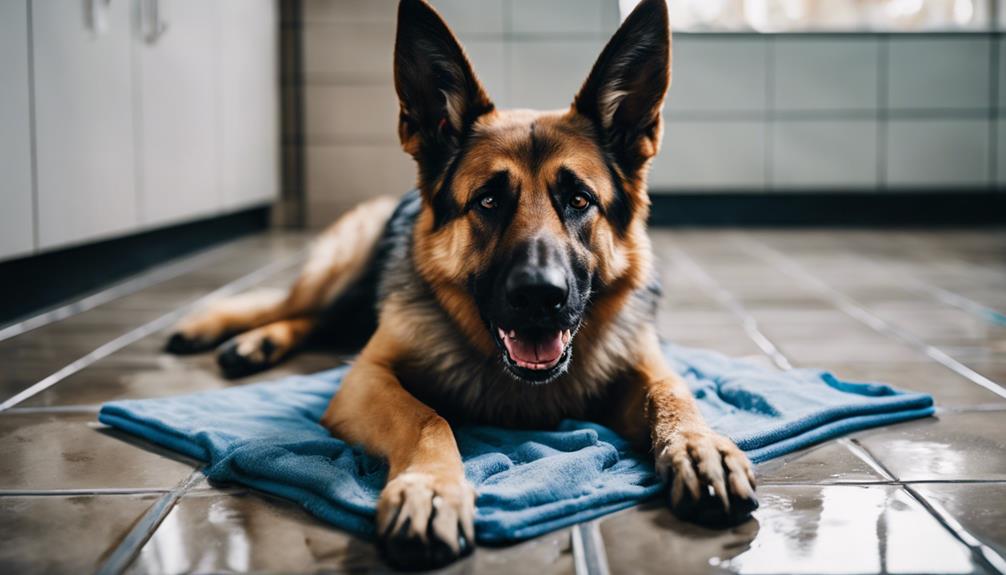
If your German Shepherd mix is showing signs of heatstroke, such as excessive panting and lethargy, it is crucial to act quickly. Move them to a cool area, provide water, and start the cooling process immediately. Recognizing the symptoms and taking immediate cooling measures can be life-saving for your furry companion.
Recognizing Heatstroke Symptoms
To safeguard your German Shepherd mix from heatstroke, stay vigilant for telltale signs of overheating like excessive panting, drooling, lethargy, and vomiting. Recognizing these symptoms early can help you address heatstroke promptly and prevent further complications. Here are three key indicators to watch for:
- Excessive Panting: If your German Shepherd mix is panting heavily even after resting, it could be a sign of heatstroke.
- Drooling: Unusual or excessive drooling beyond what is typical for your dog may indicate overheating.
- Lethargy: If your normally active German Shepherd mix becomes unusually tired or unresponsive, it could signal a problem with heat regulation.
Stay alert to these signs to ensure your furry friend stays safe and healthy.
Immediate Cooling Measures
Stay prepared to swiftly cool down your German Shepherd mix if signs of heatstroke arise by wetting their fur with cool water and moving them to a shaded area. Heatstroke can escalate quickly, leading to life-threatening situations. Once in a shaded area, use a fan or air conditioning to aid in lowering their body temperature. It's crucial to avoid using ice-cold water for cooling, as it can hinder the body's ability to regulate temperature effectively. Employ wet towels on your dog's body for evaporative cooling and offer small amounts of cool water if they are conscious. If symptoms persist or worsen, seek immediate veterinary care to ensure proper treatment and monitoring. Remember, acting promptly can make a significant difference in your German Shepherd mix's recovery from heatstroke.
Treating Common Illnesses in German Shepherd Mixes
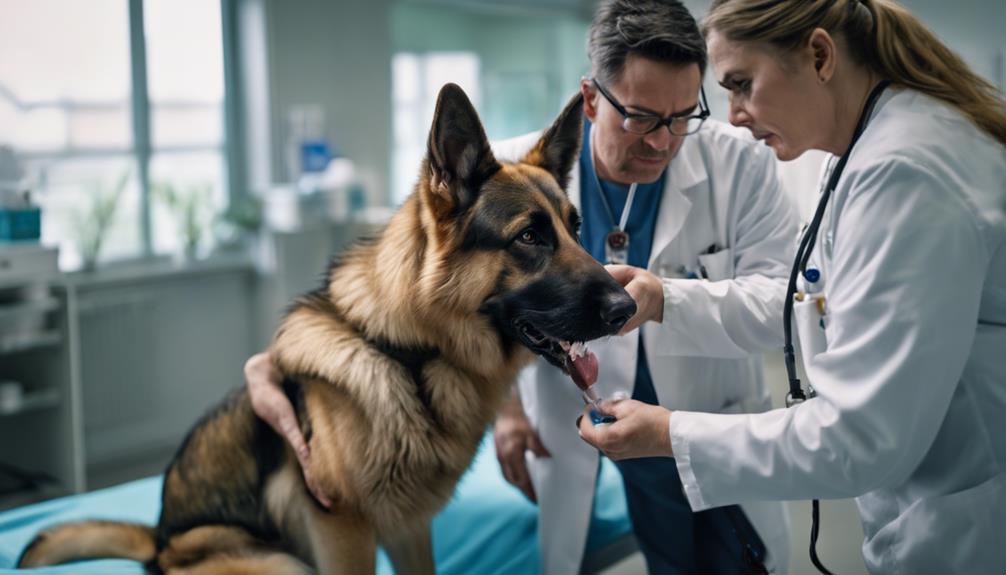
When addressing common illnesses in German Shepherd mixes, early detection through regular vet check-ups remains essential for effective management and treatment. Here are three key points to consider:
- Hip Dysplasia: This hereditary condition is prevalent in German Shepherd mixes and can cause discomfort and mobility issues. Regular vet check-ups can help monitor your dog's hip health, and early intervention, such as weight management and appropriate exercise, can mitigate the progression of this condition.
- Bloat: Also known as gastric dilation-volvulus, bloat is a life-threatening condition that can affect German Shepherd mixes. Immediate veterinary attention is crucial if you notice symptoms like a swollen abdomen, restlessness, or unproductive retching. Prevention strategies, such as feeding multiple small meals and avoiding strenuous exercise after eating, can help reduce the risk.
- Degenerative Myelopathy: This progressive spinal cord disease is common in German Shepherds and their mixes. While there is no cure, early detection through vet check-ups can help manage symptoms and improve your dog's quality of life through mobility aids and physical therapy.
Administering First Aid for Cuts and Wounds in German Shepherd Mixes
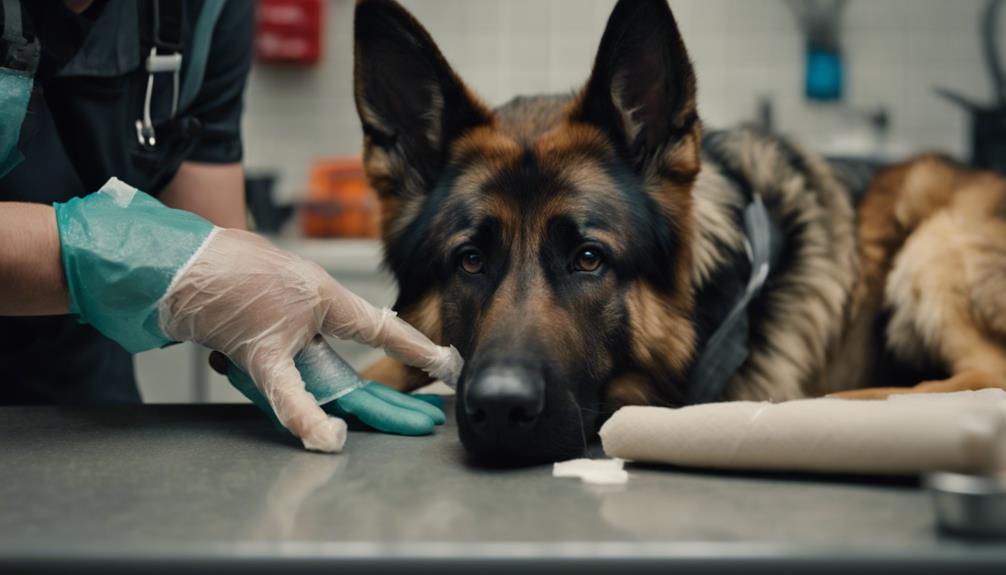
For effective wound care in German Shepherd mixes, prioritize cleaning the cut or wound with mild soap and water to prevent infection. After cleaning, apply gentle pressure to stop any bleeding before covering the wound with a clean bandage. It's crucial to monitor the wound for signs of infection such as redness, swelling, or discharge. If you notice any of these signs, consult a vet promptly for further evaluation and treatment. Remember not to use hydrogen peroxide to clean wounds, as it can hinder healing and harm healthy tissue. Keep a close eye on the wound's healing progress and seek veterinary advice if you have any concerns.
| First Aid Do's | First Aid Don'ts |
|---|---|
| Clean with mild soap | Avoid hydrogen peroxide |
| Apply pressure | Delay seeking vet advice |
| Cover with clean bandage | Ignore signs of infection |
| Monitor for infection | Neglect wound healing |
Handling Seizures in German Shepherd Mixes
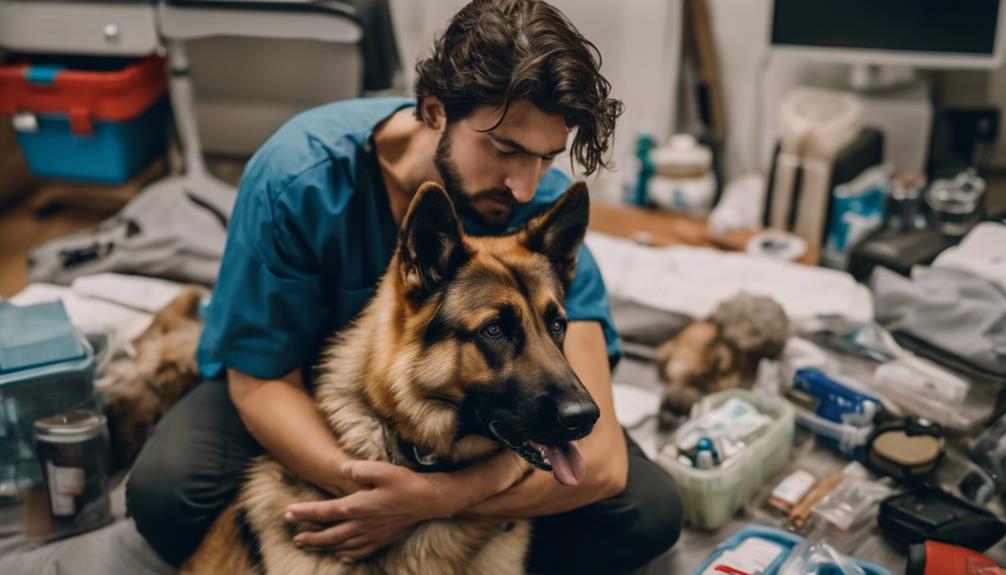
After addressing cuts and wounds, the crucial task of handling seizures in your German Shepherd mix involves understanding potential causes and ensuring safety during episodes. Seizures can be frightening, but being prepared and knowing how to respond can make a significant difference in your dog's well-being. Here are three essential steps to help you navigate through this challenging situation:
- Record Details: Keep a log of seizure occurrences noting the frequency, duration, and any potential triggers. This information can assist your veterinarian in diagnosing the underlying cause and determining the most effective treatment plan.
- Ensure Safety: Create a safe environment during a seizure by removing any nearby objects that could cause harm. Avoid touching your dog during the episode to prevent accidental injury. Providing a calm and quiet space can help reduce stress.
- Seek Veterinary Attention: If a seizure lasts longer than 5 minutes or if multiple seizures happen rapidly, contact your vet immediately. They can assess the situation, provide necessary medical intervention, and prescribe medications to manage and reduce future seizure activity effectively.
Transporting Injured German Shepherd Mixes Safely

To transport an injured German Shepherd mix safely, ensure that the dog is securely positioned in a comfortable and stable manner for the journey. It is crucial to use a sturdy and well-ventilated pet carrier or a padded, non-slip mat to provide a secure environment during transportation. Minimize the movement of the injured dog to prevent further harm or discomfort while on the road. Avoid sudden stops, sharp turns, and rough terrains to ensure a smooth and gentle ride for the injured German Shepherd mix.
Throughout the journey, monitor the dog's condition closely and be prepared to seek immediate veterinary care upon arrival. By following these guidelines and taking the necessary precautions, you can help ensure the safety and well-being of the injured German Shepherd mix during transportation. Remember, the goal is to provide the best possible care and comfort for the dog until they can receive professional veterinary assistance.
Contacting Emergency Veterinary Services for German Shepherd Mixes

When contacting emergency veterinary services for your German Shepherd mix, ensure to provide detailed information on the breed composition and any known health issues. It is crucial to communicate effectively to ensure the best care for your pet. Here are three essential steps to follow:
- Detail Breed Composition and Health Issues: Provide information about your German Shepherd mix's breed composition, any known health issues, and any medications they are currently taking. This will help the veterinary staff better understand your pet's medical history.
- Describe Symptoms and Behaviors: Mention any symptoms or behaviors that are concerning, such as difficulty breathing, seizures, or severe injuries. Clear information about your pet's condition will assist the vet in determining the best course of action.
- Follow Vet's Instructions: Be prepared to follow the vet's instructions for first aid or transportation to the clinic for immediate care. Following their guidance promptly can make a significant difference in your German Shepherd mix's outcome during an emergency situation.
Frequently Asked Questions
What Is the Most Common Cause of Death in German Shepherds?
Degenerative myelopathy is the most common cause of death in German Shepherds. Their genetic predispositions make them prone to this. Regular monitoring, early detection, and proper treatment are crucial. Be vigilant to protect your furry friend.
How Do You Take Care of a German Shepherd Mix?
Want to give your German Shepherd mix the best care? Start with tailored grooming, consistent training, engaging exercise, and regular health checkups. Understanding their unique needs is key. Consult a vet for personalized guidance.
How Long Do Mixed Breed German Shepherds Live?
Mixed breed German Shepherds usually live 10 to 14 years, influenced by genetics, care, and preventive measures. Quality of life matters. Regular vet check-ups and a loving environment help. Prioritize their needs for a longer, healthier life.
What Do German Shepherds Need the Most?
To meet German Shepherds' needs, prioritize consistent training for obedience, ample exercise for vitality, regular grooming for hygiene, and address behavioral challenges promptly. Your dedication to these aspects ensures a happy, healthy companion.
Conclusion
In conclusion, when it comes to emergency care for German Shepherd mixes, quick action is key. Recognizing signs of emergencies like bloating, breathing issues, and trauma is crucial. Remember to handle allergic reactions, poisoning incidents, and seizures promptly. Always have a first aid kit and emergency veterinary contact information on hand. Stay safe, stay prepared, and prioritize your pup's well-being with prompt and proactive care.
